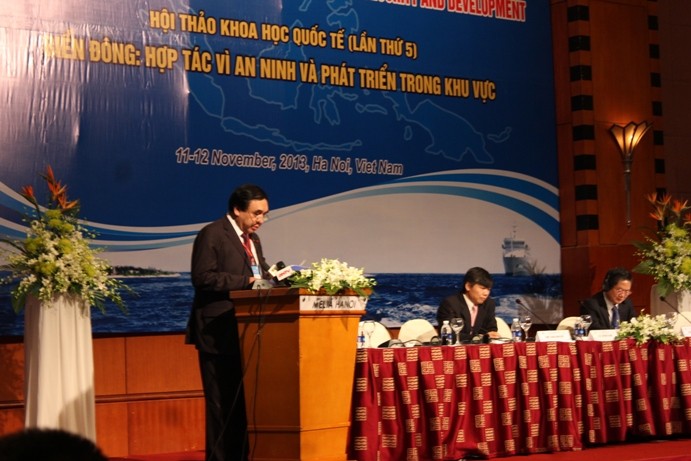(VOVworld) – The East Sea has abundant resources and is an important sea transportation route of the world. This region has implicit instabilities because of complicated disputes. The Declaration on the Conduct of Parties in the East Sea (DOC) and the future Code of Conduct of Parties in the East Sea (COC) will be an effective measure to maintain stability, peace, and friendship in this region.

ASEAN Deputy Secretary General, Nyan Lynn, at the 5th international conference on the East Sea in Hanoi |
ASEAN countries and China signed the Declaration on the Conduct of Parties in the East Sea (DOC) on November 4, 2002 in Phnom Penh, Cambodia to become the first official agreement between the two sides related to the East Sea issues.
DOC implementation creates a common voice
Under the DOC roadmap, after 9 years of negotiation, ASEAN and China reached agreement on Guidelines to Implement the DOC on July 21, 2011 in Bali, Indonesia. DOC and the Guidelines to implement it are the foundation for ASEAN countries to negotiate with China to resolve disputes in the East Sea. ASEAN Deputy Secretary General, Nyan Lynn, presented the message of the ASEAN Secretary General at the 5th international conference on the East Sea in Hanoi. “DOC sets up the principles for peace, stability, and maritime security in the East Sea. The DOC also lays the basic rules and norms for the COC such as exercising self-restraint, the conduct of activities, not complicate or escalate disputes, and affect peace and stability. DOC provides a platform for dialogue on cooperation and confident building through the implementation of cooperative projects and activities”.
Over the past decade, DOC has been a pillar in ASEAN and China’s activities relating to the East Sea disputes. But DOC is not the final target to resolve disputes. ASEAN Deputy Secretary General, Nyan Lynn, said: “The future COC should be a comprehensively and legally binding document. COC should set a set of values and norms to govern the conduct of behaviors in the East Sea to prevent and resolve incidents and create a favorable environment for comprehensive solutions for disputes in the East Sea.”
Heading towards the establishment of COC, relevant parties have to reach consensus on every article. It’s not an easy process because ASEAN and China have maintained different approaches to COC.
Similar views from DOC to COC
ASEAN and China have considered East Sea issues their top priorities in 2013. Both sides have exerted efforts to boost the formation of COC. It was described in the joint-statement released at the 16th ASEAN-China conference to celebrate 10 years of implementing DOC, the ASEAN-China consultation in September, 2013, and efforts of all ASEAN countries to work with Chinese leaders to resolve the East Sea issues. Countries have agreed that ASEAN and China have to continue to share common interests, responsibilities, and political will in building COC. Ralf Emmers is a researcher on the East Sea issues of Singapore’s S.Rajaratnam University (RSIS). “Early this year, China decided to start the consultation on the COC. China’s position used to be first we fully implement the DOC before we move on to negotiation on the COC. This is going to be a long term process. I’m not going to say that we are going to have a COC over night. But there are some indications that China is willing to talk about COC.”
Ensuring regional peace and stability
The East Sea issues are cooperation between ASEAN and China. Inappropriate resolution of these issues will lead to disagreement and negatively impact the East Sea situation.
China and ASEAN cooperation based on DOC will open opportunities to build trust and a favorable environment for COC negotiation. These positive signs have brought some hope for an effective cooperation to ensure regional peace and stability.